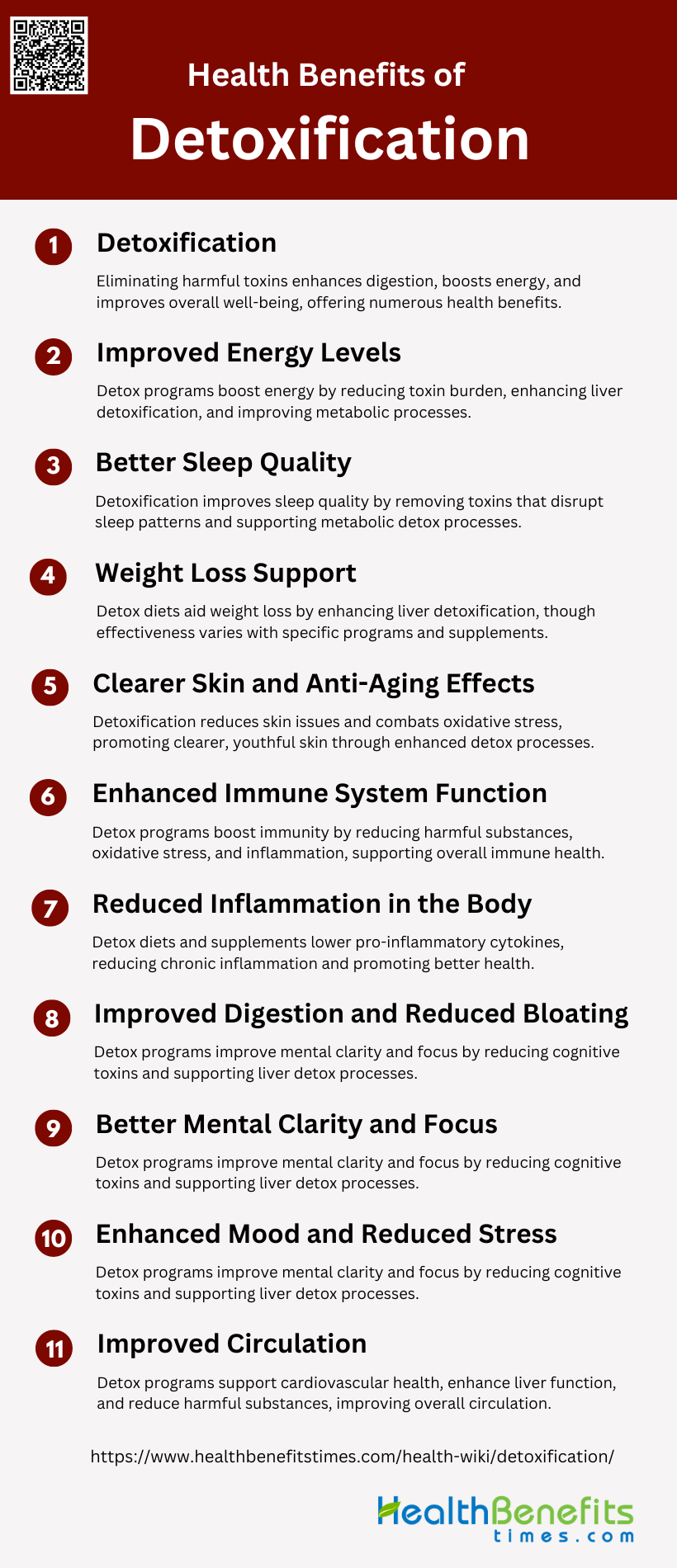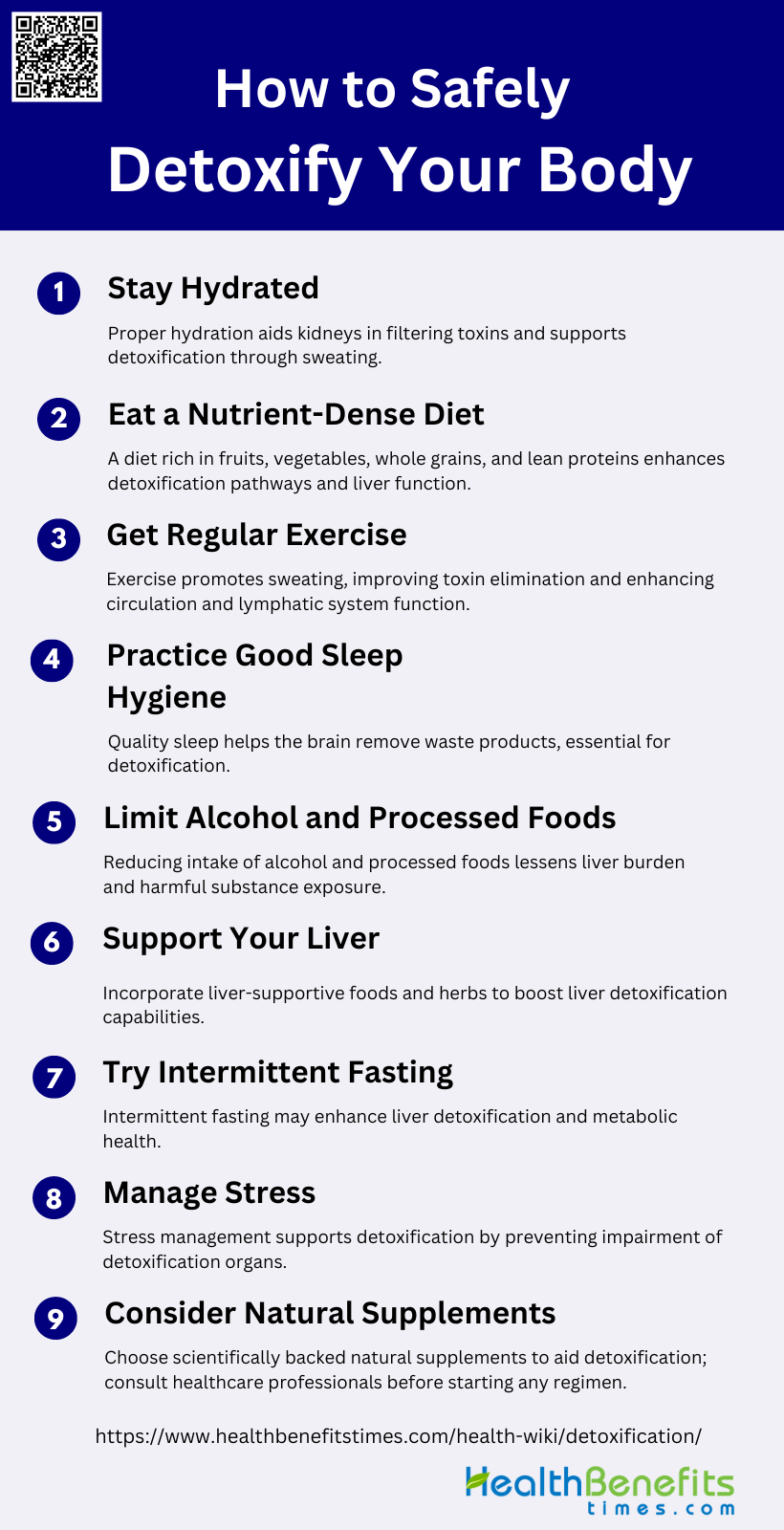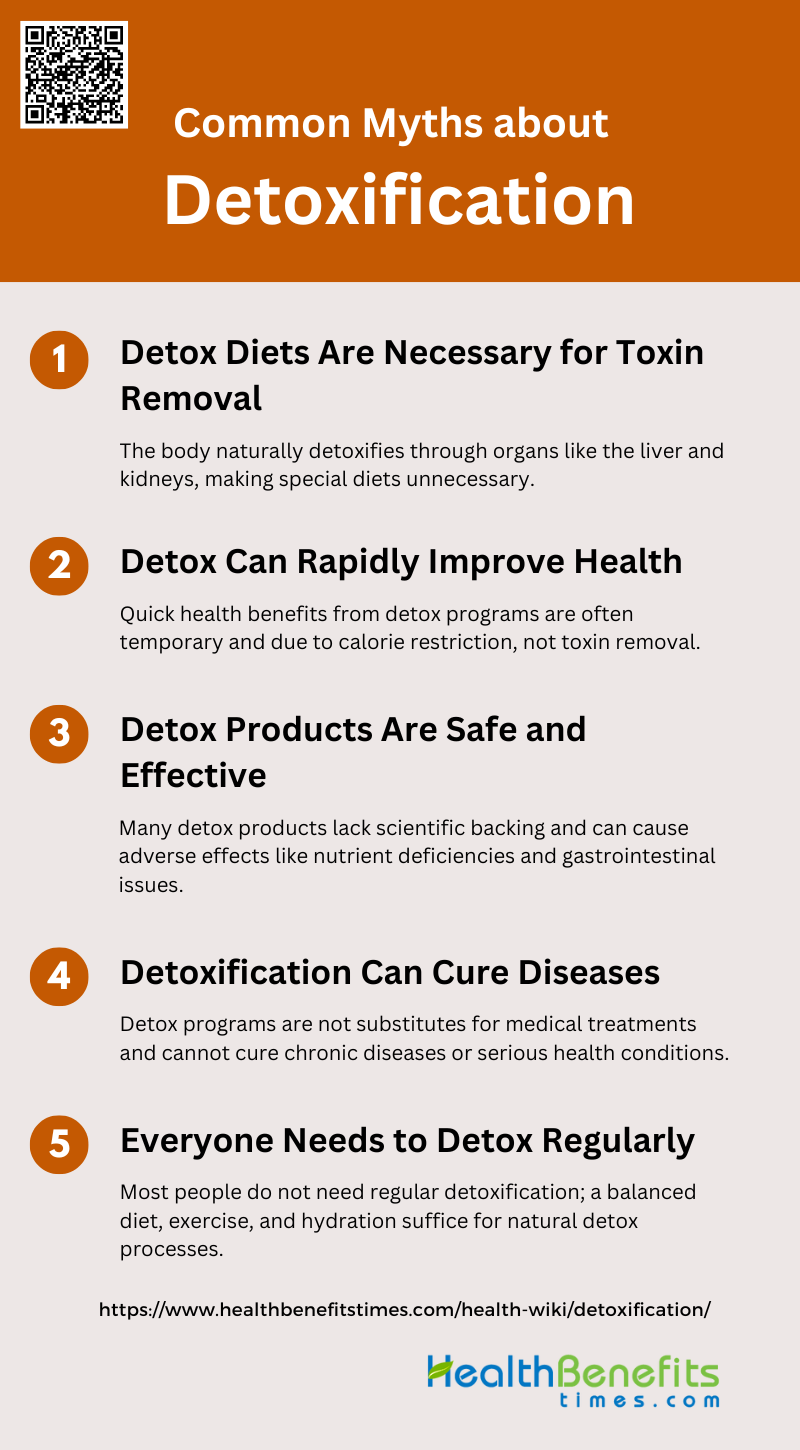Detoxification is a biological process by which living organisms eliminate or neutralize toxic substances from their bodies or environments. It involves a complex series of biochemical reactions that transform harmful compounds into less toxic or non-toxic forms, allowing for their safe removal or excretion. In humans and animals, detoxification primarily occurs in the liver, kidneys, and other organs, utilizing various enzymes and metabolic pathways to break down toxins. This process is crucial for maintaining overall health and preventing the accumulation of potentially dangerous substances. Detoxification mechanisms can also be found in plants and microorganisms, where they play a vital role in adapting to challenging environments and managing exposure to xenobiotics or naturally occurring toxins. In industrial and environmental contexts, detoxification refers to the treatment of contaminated materials or waste to reduce their toxicity and make them safer for disposal or reuse.
Types of Detoxification
Detoxification is a process aimed at removing toxins from the body to improve overall health and well-being. There are various methods to achieve detoxification, each with its unique approach and benefits. Below are some common types of detoxification methods:
1. Dietary Detox
Dietary detoxification methods, such as juice cleanses and detox diets, are popular strategies aimed at eliminating toxins and promoting weight loss. These diets often involve consuming specific foods or beverages believed to enhance liver detoxification and remove persistent organic pollutants from the body. However, the clinical evidence supporting the effectiveness of these diets is limited and often hampered by flawed methodologies and small sample sizes. Preliminary studies suggest that certain foods, like coriander and nori, may have detoxification properties, but more rigorous research is needed to confirm these effects in humans.
2. Detoxifying Supplements
Detoxifying supplements, including herbs and vitamins, are marketed to support the body’s natural detoxification processes. These supplements often contain ingredients like phycocyanobilin, N-acetylcysteine, and various herbal extracts. While some studies suggest that these supplements can support metabolic detoxification and improve quality of life, others have found no significant benefits. For instance, a study on a multi-ingredient detox supplement found no beneficial effects on body composition or gastrointestinal symptoms in healthy young adult females, indicating that the efficacy of these supplements can vary widely.
3. Mechanical Detox Methods
Mechanical detox methods, such as saunas and colonics, are used to physically remove toxins from the body. Saunas, for example, promote sweating, which can help eliminate certain toxins through the skin. Regular sauna sessions have been discussed as a complementary approach to managing conditions like ventricular hypertrophy and heart failure by reducing oxidative stress and supporting overall cardiovascular health. However, the effectiveness and safety of these methods can vary, and they should be used with caution, especially in individuals with underlying health conditions.
4. Lifestyle Changes
Lifestyle changes, including regular exercise and proper hydration, are fundamental to supporting the body’s natural detoxification processes. Exercise enhances circulation and lymphatic flow, which can help remove toxins from tissues. Hydration is crucial for maintaining kidney function and facilitating the elimination of waste products through urine. These lifestyle modifications are not only effective for detoxification but also contribute to overall health and well-being. Studies have shown that a combination of dietary and lifestyle measures can significantly improve health outcomes and support detoxification.
5. Herbal and Supplement Detoxes
Herbal detoxifiers are increasingly recognized for their potential to support the body’s detoxification systems. Herbs such as milk thistle, dandelion root, and turmeric are known for their liver-protective properties and ability to enhance detoxification pathways. These herbs can aid in the purification of the kidney, liver, gut, skin, and blood, thereby increasing overall energy and efficiency. Research indicates that herbal detoxifiers can facilitate the removal of toxins and support the function of major organs, although the effectiveness of specific herbs can vary based on their bioactive compounds and the individual’s health status.
Health benefits of Detoxification
Detoxification offers numerous health benefits by eliminating harmful toxins from the body. This process can enhance digestion, boost energy levels, and improve overall well-being. Below are some key health benefits of detoxification:
1. Improved Energy Levels
Detoxification programs have been shown to significantly improve energy levels. For instance, a study on a detox diet program in Appalachia reported significant improvements in energy levels among participants after completing the program. This increase in energy can be attributed to the reduction of toxin burden in the body, which otherwise can lead to fatigue and lethargy. Additionally, the consumption of certain foods and supplements that support liver detoxification can enhance metabolic processes, thereby boosting overall energy levels.
2. Better Sleep Quality
Participants in a detox diet program reported significant improvements in sleep quality after completing the program. This improvement is likely due to the reduction of toxins that can disrupt sleep patterns. Furthermore, a study on a plant-based dietary supplement found that participants experienced reduced sleep disruption scores, indicating better sleep quality. The removal of toxins and the support of metabolic detoxification processes can thus contribute to more restful and uninterrupted sleep.
3. Weight Loss Support
Detox diets are often marketed for their weight loss benefits. Although the evidence is mixed, some studies suggest that detoxification can support weight loss. For example, a review of detox diets indicated that certain foods and supplements might aid in weight management by enhancing liver detoxification and eliminating persistent organic pollutants. However, it is important to note that not all detox supplements are effective; a study found no significant changes in body composition or waist circumference in participants taking a detox supplement. Therefore, while detoxification may support weight loss, the effectiveness can vary depending on the specific program or supplement used.
4. Clearer Skin and Anti-Aging Effects
A study on a plant-based dietary supplement found improvements in general health and well-being, which can be reflected in skin health. Additionally, the antioxidant properties of certain detox foods and supplements can combat oxidative stress, a major factor in skin aging. By enhancing the body’s detoxification processes, these interventions can help maintain youthful and clear skin.
5. Enhanced Immune System Function
Detoxification can enhance immune system function by reducing the load of harmful substances that can impair immune responses. For instance, a study on Eurotium cristatum fermented tea showed that it modulated oxidative stress and inflammation, which are critical for a healthy immune system. By supporting liver detoxification and reducing oxidative stress, detox programs can help maintain a robust immune system, capable of effectively defending against pathogens.
6. Reduced Inflammation in the Body
Studies have shown that detox diets and supplements can lower levels of pro-inflammatory cytokines such as TNF-α, IL-6, and IL-1β. By enhancing the body’s ability to eliminate toxins and supporting antioxidant defenses, detox programs can mitigate inflammatory responses, which are often linked to chronic diseases and overall poor health.
7. Improved Digestion and Reduced Bloating
A study on a detox supplement found no significant changes in gastrointestinal symptoms, but other research suggests that detox diets can alleviate digestive issues by promoting a healthier gut environment. By removing toxins and supporting liver function, detox programs can enhance digestive health and reduce symptoms like bloating and discomfort.
8. Better Mental Clarity and Focus
Detoxification can lead to better mental clarity and focus by reducing the cognitive burden of toxins. Participants in detox programs have reported improvements in mental clarity and focus, likely due to the reduction of substances that can impair cognitive function. Additionally, the support of liver detoxification processes can enhance overall brain health, contributing to improved mental performance.
9. Enhanced Mood and Reduced Stress
Detoxification can enhance mood and reduce stress by eliminating toxins that can negatively affect mental health. Studies have shown that participants in detox programs experience improvements in mood and reductions in stress levels. The reduction of oxidative stress and inflammation, along with the support of metabolic detoxification, can contribute to a more balanced and positive mood.
10. Improved Circulation
Although specific studies on circulation are limited, the overall health benefits of detox programs, such as reduced inflammation and enhanced liver function, can contribute to better circulation. By promoting a healthier internal environment, detoxification can support the efficient transport of nutrients and oxygen throughout the body.
Potential Risks and Misconceptions of Detoxification
While detoxification is often touted for its health benefits, it is important to be aware of potential risks and misconceptions. Misunderstanding these aspects can lead to ineffective or even harmful practices. Below are some potential risks and misconceptions of detoxification:
1. Common Misconceptions
Detoxification programs are often misunderstood by the general public. Many believe that methadone maintenance treatment (MMT) is primarily for detoxification and that one can completely quit using methadone after a short period, such as 2-3 months. Additionally, there is a misconception that MMT is not a long-term treatment and that reducing methadone dosage is necessary due to its perceived harm to health. Detox diets are also popular but lack substantial clinical evidence to support their effectiveness, with many studies being flawed or conducted on animals rather than humans. Below is the list of Common Misconceptions of Detoxification:
- The body needs help to detox: The human body has efficient natural detoxification systems, primarily the liver and kidneys, which effectively remove toxins without external aid.
- Detoxing helps shed fat: Detox diets may lead to temporary weight loss due to severe calorie restriction, but they do not specifically target fat loss and can be unsustainable.
- Popular detox drinks are effective shortcuts: Many popular detox drinks lack scientific evidence supporting their efficacy in detoxification and may not provide any significant health benefits.
- Fermented drinks aid detoxification: While fermented drinks can improve gut health by increasing beneficial bacteria, there is limited evidence to suggest they significantly aid in detoxification.
- Laxatives cleanse the intestines: Laxatives can cause temporary bowel movements but do not cleanse the intestines of toxins and can lead to dehydration and electrolyte imbalances.
2. Potential Risks
Detoxification carries several potential risks, particularly when not properly managed. For instance, medically assisted alcohol detoxification can lead to cognitive impairments, increased seizures, and heightened cravings, especially with repeated withdrawal episodes. Detoxification from opioids during pregnancy is associated with a higher risk of relapse compared to opioid replacement therapy, although it does not significantly alter the risk of preterm birth or neonatal abstinence syndrome. Additionally, detoxification patients, particularly those with alcohol dependence, are at a higher risk of serious injury both before and after detoxification. Below is the list of Potential Risks of Detoxification:
- Vitamin and nutrient deficiencies: Detoxification can lead to significant vitamin and nutrient deficiencies, impacting overall health and well-being.
- Anemia: Detox diets may cause anemia due to reduced intake of essential nutrients like iron and vitamin B12.
- Muscle loss: Inadequate protein intake during detoxification can result in muscle loss, weakening the body’s physical strength.
- Heart palpitations: Electrolyte imbalances from detox diets can cause heart palpitations, posing serious cardiovascular risks.
- Digestive issues: Detox diets often lack fiber, leading to digestive issues such as constipation and bloating.
- Weakened immune system: Nutrient deficiencies from detoxification can weaken the immune system, making the body more susceptible to infections.
How to Safely Detoxify Your Body
Detoxifying your body can be beneficial, but it’s essential to do it safely to avoid potential health risks. Following evidence-based practices ensures that you support your body’s natural detoxification processes effectively. Below are some safe methods to detoxify your body:
1. Stay Hydrated
Staying hydrated is crucial for detoxification as it helps the kidneys filter out toxins more efficiently. Water aids in the transportation of nutrients and the removal of waste products from the body. According to research, sweating, which is facilitated by adequate hydration, can help excrete heavy metals such as nickel, lead, copper, and arsenic from the body. Therefore, maintaining proper hydration levels is essential for supporting the body’s natural detoxification processes.
2. Eat a Nutrient-Dense Diet
A nutrient-dense diet rich in fruits, vegetables, whole grains, and lean proteins provides essential vitamins and minerals that support the body’s detoxification pathways. Certain foods, such as coriander and nori, have been shown to possess detoxification properties, although most studies have been conducted on animals. Incorporating a variety of nutrient-rich foods can enhance liver function and overall health, aiding in the elimination of toxins.
3. Get Regular Exercise
Regular exercise promotes sweating, which is an effective way to eliminate toxins from the body. A study comparing different sweating methods found that dynamic exercise, such as running, was more effective in excreting heavy metals like nickel, lead, copper, and arsenic compared to static methods like sitting in a sauna. Exercise also improves circulation and supports the lymphatic system, further aiding in detoxification.
4. Practice Good Sleep Hygiene
Good sleep hygiene is essential for the body’s detoxification processes. During sleep, the brain undergoes a cleansing process that removes waste products accumulated throughout the day. Poor sleep can impair this process, leading to the buildup of toxins. Ensuring adequate and quality sleep supports overall health and enhances the body’s ability to detoxify naturally.
5. Limit Alcohol and Processed Foods
Limiting alcohol and processed foods is vital for reducing the intake of harmful substances that can burden the liver and other detoxification organs. Alcohol consumption can lead to liver damage, while processed foods often contain additives and preservatives that may introduce toxins into the body. Reducing the intake of these substances can help maintain liver health and improve the body’s natural detoxification capabilities.
6. Support Your Liver
Supporting liver health is crucial for effective detoxification. The liver is the primary organ responsible for metabolizing and eliminating toxins. Natural dietary compounds, such as those found in certain herbs and plants, can aid in liver detoxification and protect against toxin-induced damage. Incorporating liver-supportive foods and herbs into your diet can enhance the liver’s ability to detoxify the body.
7. Try Intermittent Fasting
Intermittent fasting can support detoxification by giving the digestive system a break and allowing the body to focus on repairing and eliminating toxins. While there is limited clinical evidence on the effectiveness of detox diets, some studies suggest that intermittent fasting may enhance liver detoxification and improve metabolic health. However, more research is needed to fully understand its benefits and risks.
8. Manage Stress
Managing stress is essential for maintaining overall health and supporting the body’s detoxification processes. Chronic stress can impair the function of detoxification organs and lead to the accumulation of toxins. Psychosocial therapies, alongside pharmacological treatments, have been shown to improve outcomes in detoxification from substances of dependence. Incorporating stress management techniques, such as mindfulness and relaxation exercises, can support the body’s natural detoxification pathways.
9. Consider Natural Supplements
Natural supplements, such as those containing herbs and plant extracts, can support the body’s detoxification processes. However, it is important to choose supplements that are backed by scientific evidence. A study on a purported detoxification supplement found no significant benefits for body composition or gastrointestinal symptoms, highlighting the need for careful selection of supplements. Natural dietary compounds have shown promise in treating toxin-induced conditions without adverse effects. Always consult with a healthcare professional before starting any new supplement regimen.
Common Myths about Detoxification
Detoxification is often surrounded by numerous misconceptions that can mislead individuals seeking to improve their health. These myths can range from the effectiveness of detox diets to the necessity of expensive supplements. Here are some common myths about detoxification:
1. Detox Diets Are Necessary for Toxin Removal
Many believe that special detox diets or cleanses are essential to remove toxins from the body. However, the human body is naturally equipped with organs like the liver, kidneys, and lungs that efficiently detoxify and eliminate harmful substances without the need for additional diets or products.
2. Detox Can Rapidly Improve Health
Some detox programs claim to offer quick health benefits, such as rapid weight loss or improved energy levels. However, these effects are often temporary and can be attributed to calorie restriction or dehydration rather than actual toxin removal.
3. Detox Products Are Safe and Effective
The market is flooded with detox teas, supplements, and other products that promise to cleanse the body. Many of these products lack scientific evidence to support their claims and can sometimes cause adverse effects, such as nutrient deficiencies or gastrointestinal issues.
4. Detoxification Can Cure Diseases
There is a misconception that detoxification can cure chronic diseases or serious health conditions. While maintaining a healthy lifestyle can support overall well-being, detox programs are not a substitute for medical treatment and should not be relied upon to cure illnesses.
5. Everyone Needs to Detox Regularly
The idea that everyone needs to undergo regular detoxification is a myth. For most people, a balanced diet, regular exercise, and adequate hydration are sufficient to maintain the body’s natural detoxification processes.






